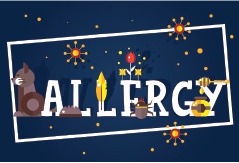
© Vector Micro Master / SHUTTERSTOCK.COM
In recent years, there has been “a significant increase in our understanding of the various aspects of allergy and its effect on various aspects of otolaryngology,” said Sarah Wise, MD, MSCR, professor of otolaryngology–head and neck surgery at Emory University in Atlanta and lead author for the 2018 International Consensus Statement on Allergy and Rhinology: Allergic Rhinitis.
Explore This Issue
September 2021The unified airway theory posits that inflammation of the paranasal sinuses, eustachian tube, larynx, and parts of the oral cavity and pharynx may be related to allergic inflammation of the nasal cavities. After all, the mucosa lining the upper and lower airways is similar, and sensitized mast cells are present in these extranasal regions as well. Numerous research studies have elucidated possible links between allergies and ear and throat complaints, suggesting that clinicians should consider allergies when managing conditions such as eustachian tube disorder, chronic otitis media, and laryngitis.
“Intuitively, a lot of people long ago understood that mucosa exposed to inhaled allergens could be involved in allergic disease,” said Christopher D. Brook, MD, professor of otolaryngology–head and neck surgery at Harvard Medical School in Boston. “Now, there’s more and more research suggesting that a lot of people who are experiencing symptoms at disparate areas in the head and neck are actually experiencing allergies. It’s been objectively shown that if you introduce allergens into different areas of the head and neck, you can elicit an allergy response.”
Shifts in climate and weather patterns have extended allergy seasons in the Northern Hemisphere, and pollen levels have been increasing for the past 20 years, according to a 2019 study (Lancet Planet. 2019;3:e124-e131). As allergy seasons intensify and move beyond their historical temporal boundaries, patients are increasingly likely to experience allergy-related symptoms, although they (and their physicians) may not initially consider allergy as a possible cause or contributing factor.
Keeping allergies and all their effects in mind can help you effectively manage a variety of disorders.
Sinuses
A 2014 evidence-based review found nearly as many articles supporting a link between allergy and sinusitis as studies that showed no link at all. The authors concluded that the role of allergy in sinusitis was “controversial, with the level of evidence poor.” Allergy testing and treatment, they wrote, could be considered as an option (Int Forum Allergy Rhinol. 2014;4:93-103).
Dr. Wise, however, has noted a link between inhaled allergens and sinusitis. “We tend to see episodes of acute sinusitis and exacerbations of chronic rhinosinusitis fairly frequently during seasonal pollen increases,” she said. She has also noticed a connection between increased sinus problems and the start of seasonal decorating.
“Every year around the holidays, we’ll have people come in with a flare-up, and I’ll ask them if they’ve been putting up holiday decorations. There’s always a handful who say, ‘That’s funny. I was doing that last week,’” Dr. Wise said. She suspects that exposure to dust and mold—via decorations and boxes that have been stored in attics and basements—may be triggering allergic reactions in at least some of her patients.